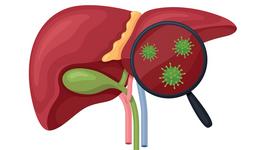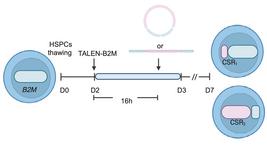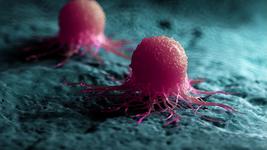CMN Weekly (20 September 2024) - Your Weekly CRISPR Medicine News
By: Gorm Palmgren - Sep. 20, 2024
CMN Intelligence - The World’s Most Comprehensive Intelligence Platform for CRISPR-Genomic Medicine and Gene-Editing Clinical Development
Providing market intelligence, data infrastructure, analytics, and reporting services for the global gene-editing sector. Read more...
Top picks
- Japanese researchers have developed a new phagemid-based system for generating CRISPR-Cas13a-loaded antibacterial capsids (AB-capsids) that offers a targeted solution for multidrug-resistant Staphylococcus aureus. Optimising phagemid copy numbers and using prophage packaging genes enhances AB-capsid yield while reducing wild-type phage contamination. This approach selectively kills resistant strains and offers a promising alternative to antibiotics and holds potential for clinical applications to treat antibiotic-resistant infections like MRSA.
- Angelman syndrome (AS) results from the loss of UBE3A in neurons, where UBE3A-ATS silences the paternal copy. Using CRISPR-dCas9 fused to DNA methyltransferase-recruiting peptides, researchers achieved targeted DNA methylation at the Snrpn-IC locus, silencing UBE3A-ATS and restoring paternal UBE3A expression in mice. This epigenetic editing approach alleviated AS symptoms, offering a promising, non-invasive therapeutic strategy for AS treatment.
Research
- The “Release of Insects carrying a Dominant-sterile Drive” (RIDD) system leverages CRISPR gene editing to target female fertility genes in Drosophila melanogaster. A 3-gRNA CRISPR drive disrupts the doublesex female exon, inducing dominant sterility. This system biases inheritance and causes female infertility, progressively suppressing and eliminating populations. RIDD combines the effectiveness of CRISPR homing drives with a self-limiting, targeted pest control approach.
- Retrons, bacterial immune systems, are adapted for genome editing by using reverse-transcribed DNA (RT-DNA) as donors. Testing over 100 retrons revealed diverse editing efficiencies, with some achieving up to 40% precision in human cells, outperforming previous retron-based editors. This highlights their potential for improved genome editing across various systems.
- A new method combines multiplexed CRISPR-based gene activation (CRISPRa) with single-cell RNA sequencing (sc-RNA-seq) to identify cis-regulatory elements that control gene expression in a cell-type-specific manner. The American researchers applied the novel approach to chronic myelogenous leukaemia cells (K562) and iPSC-derived excitatory neurons, revealing distinct regulatory patterns between cell types.
- To reduce pain, CRISPRi epigenome editing was used to target TNFR1 in a rat model of disc degeneration. By modulating TNFR1 signalling, researchers observed reduced pain behaviour and slowed disc degeneration. Notably, TNF-α injections became therapeutic after TNFR1 modulation, highlighting CRISPR-Cas as a promising approach for treating inflammation-driven disc degeneration. These findings suggest receptor-specific epigenome editing as a novel therapeutic strategy for low back pain.
- A novel engineered TadA ortholog-derived cytosine base editor (aTdCBE) can overcome existing limitations in motif preferences and adenosine activity seen in current cytosine base editors (CBEs). The new base editor enables precise cytosine base editing without generating unwanted off-target effects, improving gene editing’s scope and efficiency in treating genetic disorders.
- Researchers have introduced a novel microfluidic platform, termed Droplet Cell Pincher (DCP), to enhance CRISPR-Cas9 genome editing. The system surpasses traditional methods like electroporation by combining droplet microfluidics with cell mechanoporation to deliver CRISPR components into cells with higher efficiency and minimal cell damage. The DCP platform employed a microfluidic system that encapsulates cells in droplets, passing them through a microscale constriction to create transient disruptions in the cell membrane. This facilitates the entry of CRISPR-Cas9 ribonucleoprotein (RNP) complexes.
- The Continuous Directed Evolution system in Mammalian cells (CDEM) enables the evolution of base editors (BEs) in full-length with Cas9 nickase. Using CDEM, cytosine and adenine base editors were evolved to achieve narrower editing windows, higher precision, and reduced off-target effects. This system provides a powerful method for evolving BEs in mammalian cells, offering advantages over bacterial-based evolution systems.
- The Cas13j family, including LepCas13j and ChiCas13j, offers miniaturised RNA interference tools, overcoming AAV packaging limits. Chi-RESCUE-S, a fusion of dChiCas13j with hADAR2dd, efficiently converts A-to-G and C-to-U RNA bases. This system enables single-AAV delivery and successfully corrected mutations like APOC3D65N and SCN9AR896Q. The optimised Chi-RESCUE-S-mini3 also achieved in vivo C-to-U editing of PCSK9, reducing cholesterol levels in mice, thereby demonstrating Cas13j’s therapeutic potential.
Industry
- NanoVation Therapeutics has partnered with Novo Nordisk to develop genetic medicines targeting cardiometabolic and rare diseases. The collaboration focuses on using NanoVation’s lipid nanoparticle (lcLNP™) technology to enable nucleic acid delivery to cells beyond the liver. The multi-year deal includes up to $600 million in payments and aims to develop base-editing therapies, expanding Novo Nordisk’s capabilities in genetic medicines.
- Excision BioTherapeutics presented promising data on EBT-107, a CRISPR-based dual guide RNA therapy targeting Hepatitis B, at the 2024 International HBV Meeting. The nanoparticle-delivered therapy demonstrated significant suppression of HBV biomarkers in vitro and in vivo, addressing persistent viral infection by targeting covalently closed circular DNA (cccDNA).
- Papillon Therapeutics has received FDA Orphan Drug Designation for PPL-001, its experimental therapy for Friedreich’s ataxia. PPL-001 uses gene-corrected CD34+ stem cells to target the GAA repeat expansion in the FXN gene, addressing the root cause of the disease. Preclinical studies show potential for reversing disease progression across multiple organ systems.
- Chroma Medicine’s CRMA-1001, an epigenetic editor, has demonstrated robust and durable hepatitis B silencing in preclinical models. A single dose reduced viral surface antigen (HBsAg) by over 99%, with effects lasting over six months. CRMA-1001 silences HBV DNA without cutting it, showing high specificity and potential for transformative functional cure rates in chronic hepatitis B patients. You can see the presentation here.
- Poseida Therapeutics has received FDA Regenerative Medicine Advanced Therapy (RMAT) designation for P-BCMA-ALLO1, its allogeneic CAR-T therapy for relapsed/refractory multiple myeloma. This recognition, based on positive early Phase 1 data, supports its potential to address unmet patient needs. RMAT status enables enhanced FDA collaboration, facilitating accelerated development.
- MaxCyte has signed a strategic platform license with Kamau Therapeutics, enabling Kamau to use MaxCyte’s Flow Electroporation® and ExPERT™ technologies for homology-directed repair (HDR) gene correction. Kamau’s lead programme, nula-cel, targets sickle cell disease. The agreement supports scalable, efficient gene editing, enhancing Kamau’s clinical manufacturing process.
- Korro Bio has partnered with Novo Nordisk to develop RNA-editing therapies targeting cardiometabolic diseases, leveraging Korro’s OPERATM platform. The collaboration, valued at up to $530 million, combines Korro’s RNA-editing technology with Novo Nordisk’s expertise in cardiometabolic conditions. Korro’s oligonucleotide-directed platform edits RNA without altering DNA, offering a new approach to treating previously undruggable targets. Novo Nordisk will fund research and advance the programmes through clinical stages after preclinical development.
CRISPR screens
- CRISPR screens across multiple tumour models identified immune evasion pathways, highlighting Mga as a key modulator. In triple-negative breast cancer (TNBC), Mga knock-out enhanced antitumour immunity and inhibited tumour growth. Transcriptomics revealed its influence on immune-related pathways. Notably, low Mga expression in breast cancer patients correlated with better prognosis, suggesting Mga as a potential therapeutic target for modulating immune responses in TNBC.
Detection
- Chinese researchers present an electrochemical biosensor for detecting circulating tumour cells (CTCs) in breast cancer, leveraging folate receptor targeting and CRISPR-Cas12a for signal amplification. Using folate-coated magnetic beads to capture CTCs, mild reduction exposes cell sulfhydryl groups, enabling CRISPR activation. The system achieved highly sensitive detection (2 cells/mL) with strong selectivity and stability, offering a promising tool for CTC analysis in complex environments.
Reviews
- Emerging CRISPR Therapies for Precision Gene Editing and Modulation in the Cardiovascular Clinic. This review provides an overview of current and emerging CRISPR-mediated technologies as they pertain to the cardiovascular system, highlighting successful implementations and future challenges.
- Precise pathogen quantification by CRISPR-Cas: a sweet but tough nut to crack. This review systematically examines CRISPR-based pathogen quantification strategies, discussing their principles and applications and addressing challenges for precise quantification in various fields such as medical diagnosis, food safety, and environmental monitoring.
- Advances in targeting cancer epigenetics using CRISPR-dCas9 technology: A comprehensive review and future prospects. This review aims to summarise the latest research developments, evaluate the effectiveness and limitations of CRISPR-dCas9 applications in cancer therapy, identify critical challenges such as delivery methods and explore future directions for improving and expanding these technologies.
- Research progress on detection of foodborne pathogens: The more rapid and accurate answer to food safety. This review explores the evolution of foodborne pathogen detection techniques, highlighting the advantages of combining CRISPR-Cas systems with other methods to improve detection accuracy and efficiency.
To get more CRISPR Medicine News delivered to your inbox, sign up to the free weekly CMN Newsletter here.
Tags
CLINICAL TRIALS
IND Enabling
Phase I
Phase II
Phase III
Gastric Cancer and Colorectal Cancer, CRC, (NCT07166263)
Sponsors:
Base Therapeutics (Shanghai) Co., Ltd.
Sponsors:
Base Therapeutics (Shanghai) Co., Ltd.
IND Enabling
Phase I
Phase II
Phase III
Relapsed or Refractory Acute Myeloid Leukemia, AML, (NCT06541444)
Sponsors:
Base Therapeutics (Shanghai) Co., Ltd.
Sponsors:
Base Therapeutics (Shanghai) Co., Ltd.
IND Enabling
Phase I
Phase II
Phase III







